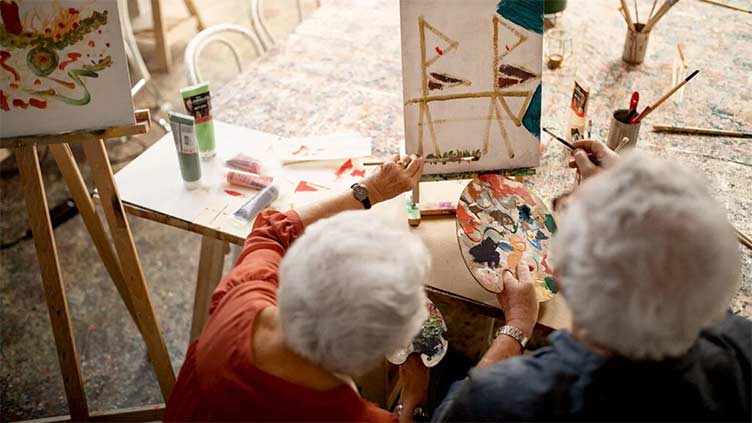Heart failure: Strengthening social bonds could improve recovery rates

Heart failure: Strengthening social bonds could improve recovery rates
ISLAMABAD, (Online) - Around 26 million people globally are affected by heart failure (HF), and over 80%Trusted Source of HF patients are over 65 years old. Despite advances in medicine and prevention strategies, readmission rates remain high.
Physical frailty — physical weakness, slowness, and low activity — is frequently linkedTrusted Source to worse HF prognosis, increased rehospitalization rates, and poor response to cardiac rehabilitation.
Few studies have investigated how social frailty — feeling disconnected from family, friends, and others — affects older HF patients. Understanding how social frailty affects HF prognosis could inform HF aftercare policies.
Recently, researchers investigated the effects of social frailty on clinical outcomes in older adults who’ve been hospitalized with HF.
They found that loss of perceived social role was linked to an increased risk of adverse events, including cardiovascular events or death.
The study was recently published in Frontiers in Cardiovascular Medicine.
How ‘social frailty’ affects heart failure
For the study, the researchers recruited 310 in-hospital HF patients with an average age of 78 years old. Around half of those subjects were female.
Each subject answered a self-reported questionnaire asking about their social engagement, such as whether they live alone, how useful they feel to friends and family, and whether they talk with someone each day.
Subjects were then followed for an average of around 2 years. Of the 310 patients, 61% — or 188 — had social frailty. Within 2 years, 75 patients — or 24% — either died or had another cardiovascular event.
From statistical analyses, the researchers found that patients with social frailty were around twice as likely than those without to have experienced a cardiovascular event or died within two years of HF.
The findings also show that people who felt they were not helpful to friends or family were especially likely to experience a cardiovascular event or death.
The importance of social connectedness
When asked why social frailty may make heart failure prognosis worse, Angelina R. Sutin, Ph.D., professor at the Department of Behavioral Sciences and Social Medicine at Florida State University College of Medicine, not involved in the study, told Medical News Today:
“Humans need social interaction and support, and there is a large literature that shows what happens when these needs are not met.”
“Individuals who report loneliness, for example, tend to engage in poor health-related behaviors such as sedentary behavior and substance use. [They also] have more disease burden, poor cognitive health, and faster progression of disease. These factors put individuals at even greater risk when heart disease develops as social disconnection has already taken a toll on the body.”
– Dr. Angelina Sutin, professor of behavioral sciences
Dr. Sutin cited related research, notably a review and meta-analysis she conducted, showing that several aspects of social health — loneliness, living alone, and social isolation — were associated with increased mortality risk among those with cardiovascular disease.
Dr. Johanna Contreras, an advanced heart failure and transplant cardiologist at Mount Sinai Hospital in New York, not involved in the study, told MNT:
“As patients get older with heart failure, they have a decline not only [in] the physical functions but also cognitive functions, like remembering to take medicines, manage their medicines, their food, and their oral intake.”
Dr. Contreras added that social support and community that help patients feel motivated to do better and keep up with medication, doctor appointments, and diet and exercise may give patients a better prognosis.
Feeling useful may lead to improved outcomes
MNT asked study author Satoshi Katano, Ph.D., of the Division of Rehabilitation at Sapporo Medical University Hospital, how feelings of not being useful may affect HF prognosis.
“Those who believe themselves not to be helpful have less social connections, worse self-efficacy and control, less social support, and lower resilience than those who believe themselves to be useful,” Dr. Katano explained.
“Additionally, a poor sense of usefulness has been shown to lead to less optimal healthcare-seeking behaviors and less engagement in preventive and health-promoting activities, subsequently influencing one’s health or leading to more rapid declines in health.”
Holiday heart attacks
Research shows that the rate of heart attacks tends to increaseTrusted Source during the holidays and other notable social events.
MNT asked Daniel Fulford, Ph.D., psychologist and associate professor at Boston University, not involved in the study, whether there was any association between the recent study findings and the uptick in heart attacks during the holidays.
He noted that this is unlikely as the health effects of social frailty arise after a long period of time.
“I wouldn’t attribute a major medical event, like heart failure, to an acute change in social connection,” Dr. Fulford said. “It is most likely abrupt changes in diet and routine that increase [the] risk of such events during the holidays.”
MNT asked Dr. Fulford how these findings may relate to broken heart syndrome.
“In broken heart syndrome, or takotsubo cardiomyopathy, people experience acute chest pain and shortness of breath in relation to extreme distress,” Dr. Fulford explained.
“While the mechanisms that explain this phenomenon are unknown, I’d imagine the acute distress of an interpersonal loss could trigger such an experience. But again, the research on the impact of social disconnection and physical health outcomes suggests these processes unfold over longer periods of time,” he added.

